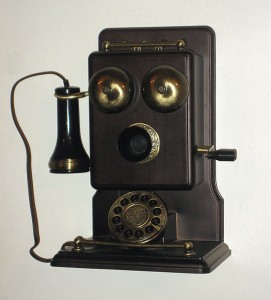5 ways your business can become more sustainable at little or no cost to you
I’m assuming you’re already recycling and turning the lights off when you’re out and such because it is 2014 and these things are kind of automatic for most people now. So here are some extra ways in which you can make the planet and your pocket happy…
1) End of your mobile contract?
Phone still in good working order? Get a sim-only contract. Your phone contains heavy metals and minerals sourced through conflict, plus the people who made it probably didn’t have that much fun doing it. You’ll likely cut your mobile bill in half by doing this, and when your phone does start to conk out (mine is getting there at just over four years old) consider buying a Fairphone.
I saved: £240 a year
2) Switch your electricity supplier…
…to one that creates their power sustainably, and/or join a local energy co-op. Choose from Good Energy, Green Energy and Ecotricity. It means that you’re not funding nuclear or coal-fired power stations. You can compare prices easily on-line – you just need an old bill. Switching is painless these days too!
Cost me: £14 a month cheaper than the cheapest on Compare the Market – less than 50p a day to know I’m not investing in dirty energy.

3) Try having a vegan lunch once a week
We all know that animal farming produces more greenhouse gases than all transport methods combined, so cutting out meat, dairy and eggs from our diet as much as we can bear to is a Good Thing. However, I am totally aware that the very idea of an animal-free diet can send dedicated meat-hounds into cold turkey (sorry). Once a week is doable though, is it not? A quick and tasty sandwich option could be humous, sun-dried tomatoes, salad leaves and basil, and lots of chain shops do things like three-bean salads if you need to grab something on the run. Cardiff is positively bursting at the seams with places you can get a vegan lunch – check out Eat Out Vegan Wales for places in your area, and the Happy Cow website for locations nationwide. There about three zillion recipe ideas on the internet and some of the best are on The Vegan Society’s site.
Cost: nothing more than what you’re paying already
4) Switch off things that are on stand-by at the end of the day
Apparently the average cost of leaving electrical goods on standby rather than switching them off at the wall is 9% to 16% of a household’s annual electricity bill. Being that offices tend to have more things plugged in to a smaller space, you can bet it’s an even bigger proportion of your business overheads.
I work out of a home office and I have two extension leads under my desk – one that stays on because it powers the land-line and router and such, and another that can be turned off at the end of the day once my computer is off – it powers things like the mac, the display, the printer and the external hard-drive. Simple!
Saving: £50+ a year
5) City car club
If like me you work from home, you may not actually need a car. If you live in a city likely there’s a nippy little hatchback just around the corner that you can hire for a small hourly rate for when you need to get to meetings. And when you’re hiring a car you’re more likely to check out what the public transport options are, too.
Adding up insurance, vehicle excise duty, MOT, servicing and the occasional fix a thirteen-year-old VW T4 needs, the camper van costs me £100 a month plus fuel, so it’s a real luxury, and I justify its ownership by the fact that I don’t take foreign holidays and I can just bugger off whenever I want and pull up in the driveway of my friend’s smallholding in West Wales and wake to the sound of wood peckers and goldfinches and chiff-chaffs.
But surely, at a cost of £1200 a year, I could easily hire vans? or hire cars and just use a tent? It’s an emotional decision to keep hold of it – I converted it to a camper myself using reclaimed wood and it has a beautiful wood burner fitted which means it’s kind of my escape pod all year round… all I’m saying is, do the maths, find out how much your car actually costs you, look up where your nearest car club vehicle is and how much that would cost.
Maybe set yourself a challenge to see if you can go without your car for a month with an amazing reward if you succeed, like dinner at IMHO the best restaurant in Cardiff, Canteen on Clifton Street?
Other options are to share the costs and responsibilities of a car with neighbours or friends (Lancaster Cohousing project has this down to a tee), or even working out how much taxis would cost you for the journeys you need to make that you can’t do by public transport. Likely that if you don’t use your car that much it’ll still save you money.
Savings: your mileage may vary!
If you can think of any other simple things to add to this list I’d love to hear your suggestions! 🙂


